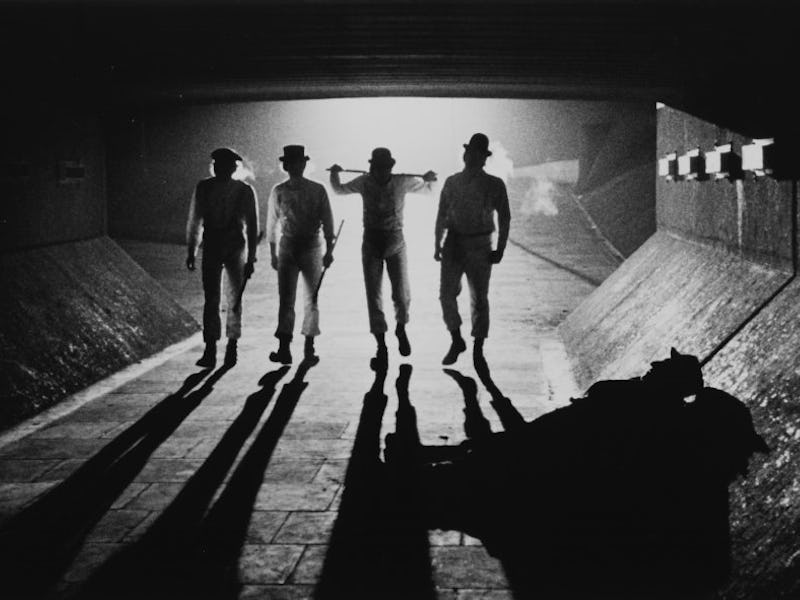You need to watch the most disturbing dystopian movie on HBO Max before it leaves this week
When Stanley Kubrick unleashed this controversial classic, the world was unprepared for its impact.

What goes on inside the mind of a sociopath? In 1971, Stanley Kubrick used every tool in a filmmaker’s toolbox to find out. The result of this work was downright terrifying, sickening, and to our individual abject horror, alluring. Fifty years later, it stands the test of time.
While this mostly faithful adaptation of Anthony Burgess’ 1962 novel will celebrate its fiftieth anniversary in December, it’s set to leave HBO Max on July 31. There is no better time than now to dive into A Clockwork Orange, which is not just a Kubrick classic but is regarded as one of the best films in cinematic history.
From the influence of its anti-hero — a 17-year-old played by Malcolm McDowell, aged 28 at the time of his performance — to the subjective ways it portrays his hobbies of rampant violence and sexual assault, A Clockwork Orange has plenty to offer, even five decades since it first premiered. And not even a lame Space Jam: A New Legacy cameo is enough to tarnish its titanic power.
Set in a near-future dystopian Britain, teenager Alex (McDowell) and his gang of “droogs” roam the streets for fun. When we meet them, they’re getting nice and high next to opera buffs at a “milk bar” — where milk is served laced with drugs — before taking to the streets to assault an old man brutally. They run into a rival gang (in the midst of their own rape of a young woman) before driving to the countryside to invade the home of a writer Frank Alexander (Patrick Magee) and his wife. He does all of this to his own rendition of “Singin’ in the Rain.”
“It was absolutely necessary to give weight to Alex's brutality.”
And that’s Alex’s life, full of violence, pain, and pleasure — never at his expense. But when Alex is finally arrested and sentenced to 14 years, Alex is subjected to an experimental form of aversion therapy that may condition him to become a better member of society. (If you’ve been on the internet long enough, you might recognize this scene from GIFs.) What follows is an odyssey where a reformed Alex endures the same pain he inflicted on others before arriving at a place you may not quite expect the story to end.
No matter your tolerance for gruesome content — and fair warning, there’s a lot to stomach — what’s important about A Clockwork Orange is how much of its world is seen from Alex’s view. Clockwork Orange exists not to champion Alex as a protagonist but to allow us perverse catharsis as we take on the perspective of a dysfunctional teenager. The painterly composition, Looney Tunes-esque sound effects, and juxtaposed classical music that score the most abhorring violence exist to show how and what Alex views his actions to be: playful.
A Clockwork Orange is many things — subtle isn’t one of them.
Unlike how attractive modern icons like Tony Stark, Walter White, or Hannibal Lecter are, Alex is a cultured, intelligent, and eloquently-spoken individual who commands attention. He loves art, particularly Beethoven, and his affections for his pet snake — a metaphor of his endless lust — proves he is willing to care for a living thing.
We are naturally susceptible to people like Alex, and Alex is an extreme example. His own spoken words are a unique slang called Nadsat, a hybrid of English, Russian, German, and Cockney. Clockwork Orange author Anthony Burgess was a passionate linguist who invented Nadsat to give Orange a timeless quality and reinforce Alex as a personality separate from the world around him. And for us, the audience, well: With words like eggiweg and guttiwuts, we find ourselves hanging on his every word just trying to keep up.
A Clockwork Orange requires an iron stomach, but it’s important not to lose sight of the subjective perspective it takes on its troubled anti-hero.
Alex and his Nadsat tongue narrate the film, but Kubrick and cinematographer John Alcott add to the mystique of Alex. The filmmakers use wide-angle lenses throughout the film; standard lenses are used when Alex is the only one in the frame.
This results in a movie where Alex is almost always in sharp focus, while his world is distorted like a funhouse mirror. It presents Alex as the only one who is “normal.” While Alex ping pongs around hypocritical authority figures and institutions that try to condition his behavior — to become the titular “Clockwork Orange,” organic on the outside but artificial on the inside — Alex is one of the few characters in the story to be precisely who he says he is. He is nothing if not honest.
In a 1972 Sight & Sound interview with Philip Strick and Penelope Houston, Kubrick clarified that Alex is not some misunderstood figure but the complete “personification of evil.” Still, he had “winning qualities.”
“His total candor, his wit, his intelligence and his energy; these are attractive qualities and ones, I might add, which he shares with Richard III,” Kubrick said.
“It was absolutely necessary to give weight to Alex's brutality, otherwise I think there would be moral confusion with respect to what the government does to him,” the director added. “It is necessary for man to have choice to be good or evil, even if he chooses evil. To deprive him of this choice is to make him something less than human — a clockwork orange.”
A Clockwork Orange is streaming now on HBO Max until July 31.
This article was originally published on